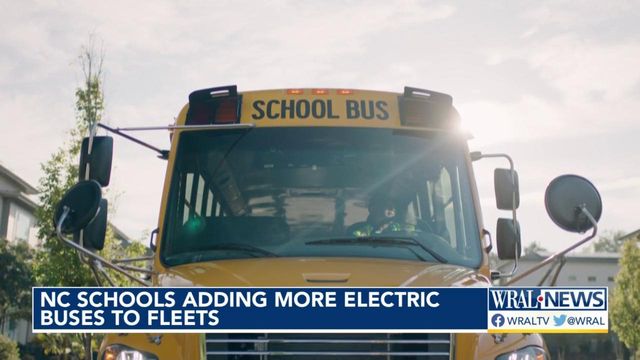North Carolina schools are embracing electric buses
School buses make up the largest mass transportation fleet in the country and 99% currently run on diesel fuel that emits harmful pollution into the air, but the wheels are in motion to bring cleaner and greener electric buses to North Carolina.
The Department of Environmental Quality has awarded grants for 49 battery-powered buses to school districts using funds from a $30-million settlement with Volkswagon for Clean Air Act violations.
The transportation sector is the biggest emitter of greenhouse gases in the state, according to Shawn Taylor with the DEQ's Division of Air Quality. He says heavy-duty vehicles, including school buses, make up about 3% of the vehicles on the road, but can account for more than 30% of harmful air pollutants.
"An electric school bus emits zero greenhouse gases that contribute to climate change and also emit none of the other harmful pollutants, including nitrous oxide and particulate matter that burning diesel fuel produces," Taylor said.
Diesel exhaust ranks among the pollutants that EPA believes pose the greatest public health risks and young children are particularly susceptible to air pollution.
Taylor says the majority of the DEQ grants for electric buses went to rural counties and that the program targeted 37 historically underserved counties.
Buses have already been delivered to the Eastern Band of Cherokee Indians, Randolph County Schools, Transylvania County Schools, Cabarrus County Schools and Rowan County Schools. Taylor expects all of the awarded buses to be in service within two years.
Many of the new buses will be made by Thomas Built Buses in High Point, North Carolina. Thomas already has 400 electric school buses in service nationally.
“We're starting to cobble together usage data from the vehicles that are on the road in North Carolina," said Kelly Rivera, general manager for Carolina Thomas. "We're seeing the operating costs being less than half of what you can operate a diesel bus for and that includes electricity as fuel as well as the maintenance of the vehicle."
But there is a large up-front investment for schools, as new electric buses can cost as much as three times more than their diesel-fueled counterparts.
Installing charging infrastructure is another funding hurdle for the electric bus transition.
"Historically, when you purchase a school bus or any large vehicle, you don't also have to purchase a gas station with it," Rivera said. "It's something that's already in place, so charging can be a challenge for school systems."
The EPA's Clean School Bus Program is providing $5 billion over five years to help schools with the costs of adding electric buses to fleets, with funding from the bipartisan infrastructure law.
In the first round of grants, Discovery Charter School in Durham was awarded funds for six new battery-powered buses and Mina Charter School of Lee County will be getting seven.
Replacing the nation’s fleet of diesel buses with electric transportation would cut carbon emissions by about 8 million metric tons per year.











